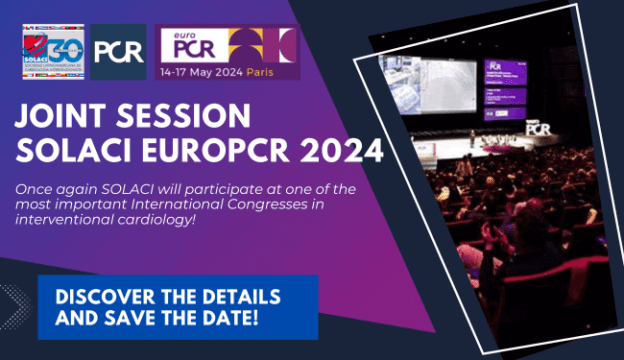1- What to Do with Blood Pressure Levels Between 130/80 and 139/89 mmHg
The decision to be made with a treatment-free patient with systolic blood pressure over 160 mmHg or diastolic blood pressure over 100 mmHg is an easy one. All guidelines agree: treatment should be started immediately alongside lifestyle changes.
Read also HERE
2- Low-Risk TAVR Trending in All Papers
Transcatheter aortic valve replacement (TAVR) in low-risk patients with symptomatic severe aortic stenosis appears to be safe at one year. In a follow-up using computerized tomography (TC), hypoattenuated leaflet thickening was observed in a minority of patients, but it did not have a long-term hemodynamic impact. It should be noted that the management strategy for this finding/problem is still unclear, as is the optimal antithrombotic/antiplatelet therapy for TAVR (both general and for specific populations).
Read also HERE
3- SOLACI Congress 2019 | Discover the Preliminary Scientific Program
We hereby present the preliminary scientific program for the SOLACI-SBHCI 2019 Congress that will take place from August 1st to 3rd at the Frei Caneca Convention Center in the city of São Paulo, Brazil.
Read also HERE
4- The FDA Affirms Mortality Signs with Paclitaxel Based Devices
Evidently, we are still uncertain. The information goes both ways, even on our own web page, we have been coming and going just like any other publication around the world.
Read also HERE
5- Cardiovascular Risk, Dual Antiplatelet Therapy, and Age. What Should We Know?
Non-adherence to dual antiplatelet therapy varies with age and patients older than 75 years old are those who discontinue treatment most frequently. However, this characteristic in elderly patients was not associated with more cardiovascular events.
Read also HERE
6- Good News at 3 Years for “Valve-in-Valve”
In this new era, the paradigm to treat the whole spectrum of transcatheter aortic valve replacement (TAVR) patients has started to shift beyond risk. However, broadening the spectrum raises the question of durability, which is why any long-term TAVR outcomes in any context are welcome.
Read also HERE
7- New Risk Factors: Air Pollution, Air Temperature, Pain, and Sleep Hours
Traditionally, we have used age, gender, obesity, hypertension, dyslipidemia, smoking, and diabetes as cardiovascular risk factors. However, this new era (during which the changes made to care for our shared home, the planet, will play a key role) has seen the emergence of new factors such as pollution, noise, temperature, sleep hours, and air quality. These elements are usually underappreciated compared with traditional factors, but recent studies show that the former are as important as the latter.
Read also HERE
8- 500 Years after What Might Have Been the Start of Modern Cardiology
500 years have passed since Leonardo da Vinci passed away (1452–1519), which is why we believe this is the perfect time to remember his passionate effort to study the human heart.
Read also HERE
9- Antianginal Medication Before and After Rechanneling
Escalation or de-escalation of antianginal medication was less common than treatment continuation without change after a chronic total occlusion rechanneling, with little variation according to the site. Further research is needed to identify patients who would benefit (or not) from these drugs and to develop strategies to adjust treatment during follow-up.
Read also HERE
10- Antithrombotic Strategies in Atrial Fibrillation and Angioplasty
What is the most appropriate antithrombotic strategy for a patient with atrial fibrillation and coronary artery disease, particularly when admitted with acute coronary syndrome or undergoing coronary angioplasty? This is a question whose answer is still in the works and that literature is addressing dynamically. Whatever we read yesterday may already be out of date today, but the problem remains the same: proper balance between ischemic risk and bleeding risk.
Read also HERE
Subscribe to our weekly newsletter
Get the latest scientific articles on interventional cardiology
We are interested in your opinion. Please, leave your comments, thoughts, questions, etc., below. They will be most welcome.





